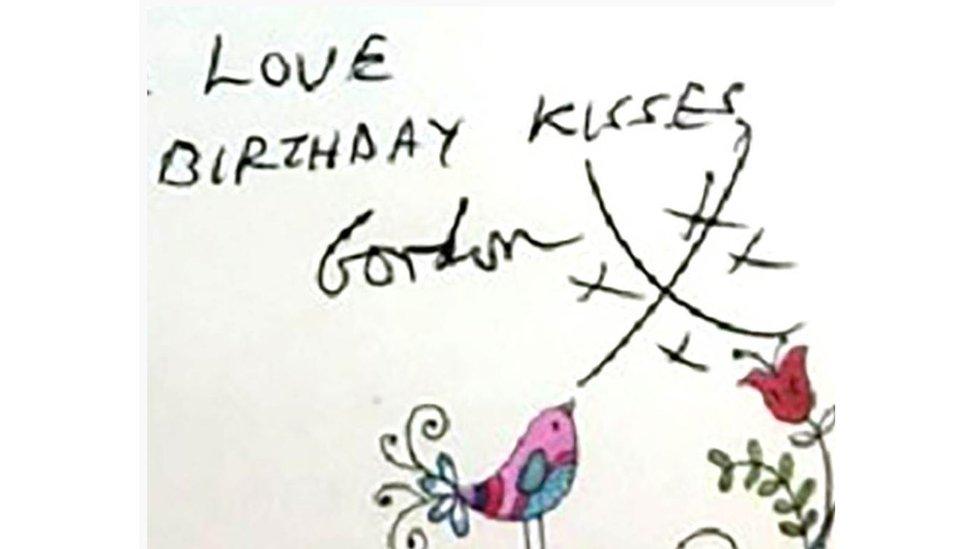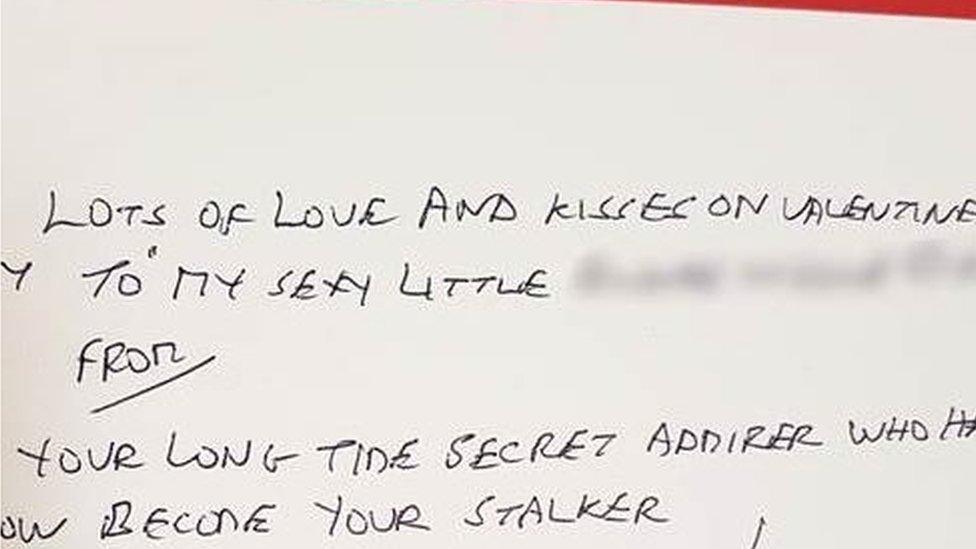Alex Lovell: 'He said he was close enough to smell my hair'
- Published

Alex Lovell has been a BBC presenter since 2005
BBC news presenter Alex Lovell suffered years of unwanted and increasingly menacing attention from a viewer.
Gordon Hawthorn, 69, was jailed in January for his six-year stalking campaign which Alex said left her feeling "frightened and watched".
To mark National Stalking Awareness Week, and to raise awareness about the psychological trauma this crime causes, the BBC Points West anchor has spoken about her experience.
'It was his new year's resolution to have sex with me'

Gordon Hawthorn's DNA matched that found on cards sent to Alex
It all started with greetings cards arriving at the BBC in Bristol, in 2013, filled with filthy fantasies and signed "Gordon".
They were usually innocent looking, featuring fluffy animals. They each had a distinctive large kiss and four small kisses in between.
The cards kept on arriving for about four years at fairly regular intervals, but from the beginning they weren't like the other correspondence I welcome from viewers.
They were crude and very graphic.
I stored them, and my boss knew about them, but I never did more than that, filing them under "of concern" in my mind.
Then in 2016 the tone of the cards changed and suddenly Gordon was threatening me.
He said it was his new year's resolution to have sex with me and if I didn't comply, he would rape me.
I'll never forget reading those words - made all the more frightening I think by the fact that this person had been persistent and dogged in his attention for four years already.
'A sick escalation in disgusting content'

The BBC Points West presenter was determined to continue working, despite suffering panic attacks
I told my boss, news editor Neil Bennett, who was brilliant and called the police immediately.
They took it very seriously. That was enormously reassuring.
The police guided me in ways to keep myself safe, by changing my driving routes, not leaving work without a colleague, even for coffee, and CCTV security at home.
The increasingly threatening cards carried on arriving for another two years and - as is common in cases of stalking - each one was more alarming than the last.
It was a sick escalation in disgusting content.
The sender said he was close enough to smell my hair, described what he would do to me and how he'd raped many times before.
He signed them: "From your stalker and soon to be your rapist."
I had to change so many things in my life and was looking over my shoulder constantly.
I was jumpy - I had heightened awareness of everything around me.
'It is unacceptable for someone to make you feel afraid'

Ms Lovell contacted police in January 2016 when the cards started to become more threatening
In the end Gordon Hawthorn was caught following a police appeal, when a member of the public told officers she had received a similar card to the ones I had received.
In my case it was clear when to call the police, but in many instances it's not that easy for the victim to know when to ask for help, which is why I want to speak out.
This is not the first time I have had attention that I found frightening and intimidating but it took an extreme event to make me call the police and ask for help.
This is very common.
Police say on average around 100 incidents take place before a stalking crime is reported.
But stalking isn't restricted to the extreme acts of intimidation or obsession that we see in dramas.
It can be much more subtle and low level.
It is unacceptable for someone to make you feel afraid or threatened, to make you change aspects of your life to avoid them or protect yourself.
'No-one asks to be stalked'

Alex always had to be accompanied by colleagues when leaving the BBC studio
The test is, if it feels wrong then trust your instinct.
Stalking takes different forms - don't excuse it. Victims of all sorts of crimes often doubt and blame themselves.
No-one asks to be stalked.
Make a note of everything. How you feel is as powerful as physical evidence in this crime.
Believe me - if it started with a seemingly innocent bunch of flowers, but escalated to the point that you were afraid to leave the house - you would find it hard to remember each odd thing that had built up to this terrible situation.
Tell someone: all my neighbours, friends and closest colleagues knew about my situation and I found enormous reassurance in their protection.
Tell the police if you can.
Even if you don't want the person who is stalking you to know, it can be logged and the police will advise you what to do.
For more advice, contact an organisation such as the Suzy Lamplugh Trust., external
As told to Sharon Alcock
- Published3 January 2019

- Published29 November 2018
